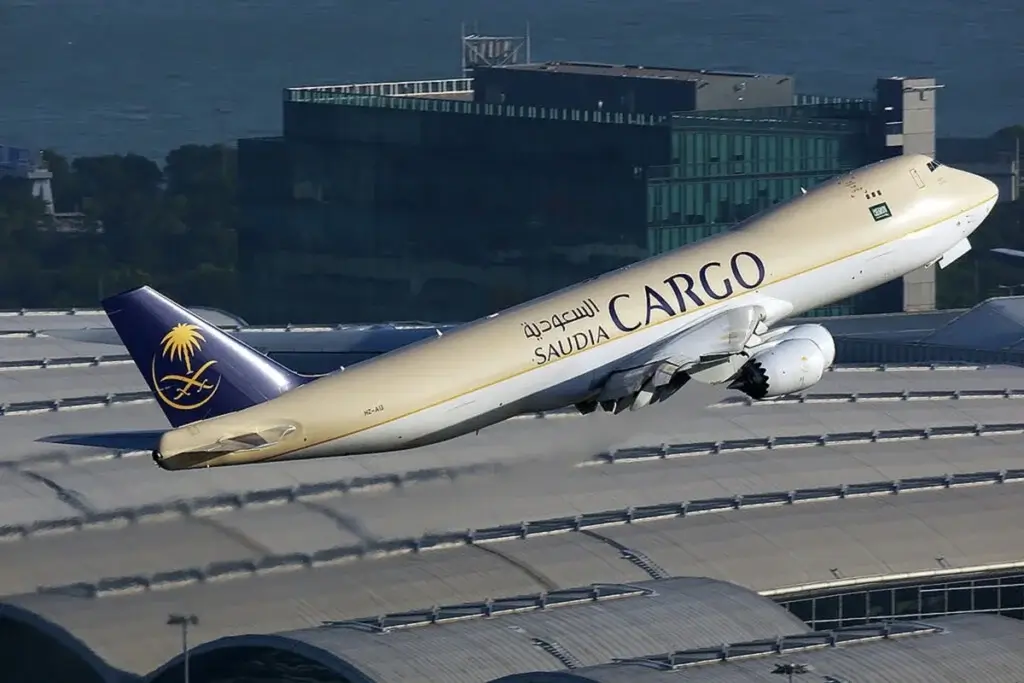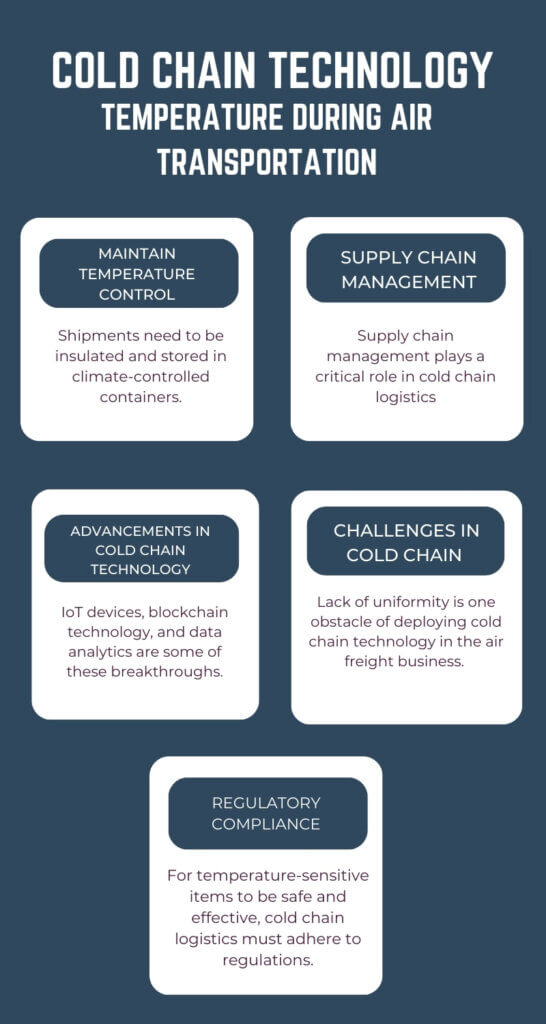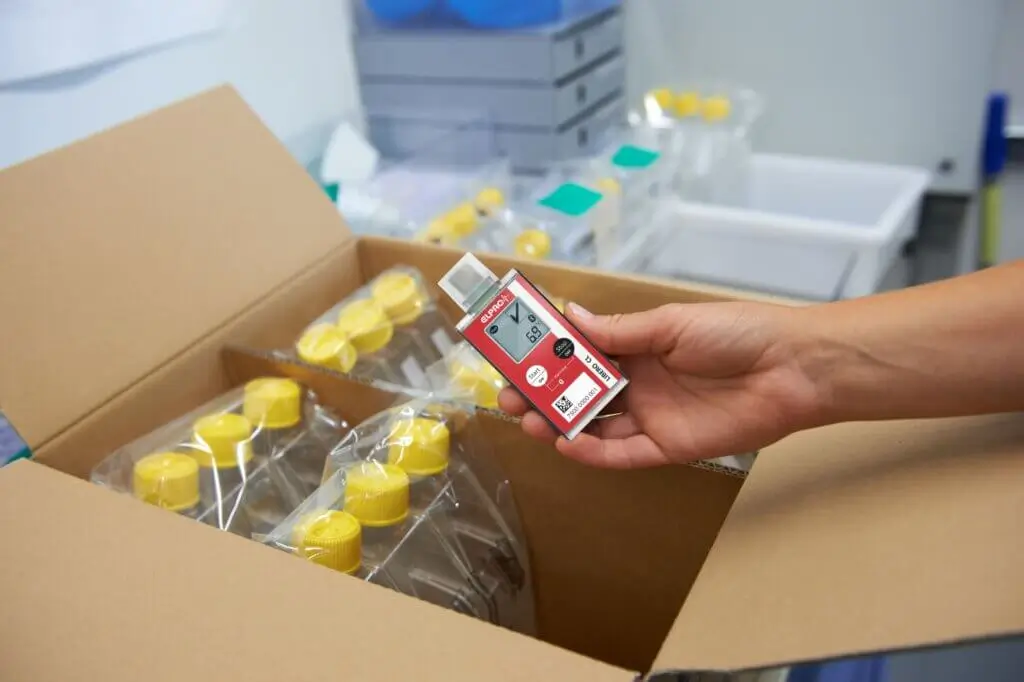
The delivery and storage of temperature-sensitive goods, such as food, medications, and other perishables, is one of the continuous problems in air freight operations.

The integrity and quality of these products depend on proper temperature control, and any deviation from the recommended range can lead to significant losses. Thanks to the advancements in cold chain technology, the air freight industry can now ensure that temperature-sensitive goods are transported and stored properly.
Maintain temperature control

Goods that are temperature-sensitive are challenging to export; shipments need to be insulated and stored in climate-controlled containers. Any departure from the specified temperature range may have an impact on the cargo’s effectiveness and quality, as well as cause product deterioration, spoiling, and loss. These losses can have serious repercussions, such as harm to one’s finances, breaking rules, and harm to one’s reputation as a brand.
The importance of using cold chain technology in air freight has increased with the growth of the food and pharmaceutical industries. In order to ensure the safety and efficacy of vaccines, biologics, and other life-saving drugs, strict temperature control is required throughout transportation. In contrast, in order to maintain their freshness and quality throughout transit, perishable items like fruit, vegetables, and seafood require temperature control.
Supply chain management

In order to maintain the right temperature for items during the packaging, shipping, storage, and distribution processes, supply chain management plays a critical role in cold chain logistics. The employment of technology like as sensors and data recorders has made tracking and monitoring temperatures in the cold supply chain easier.
Cold chain packaging and containers come in a number of kinds, including insulated, climate-controlled, and refrigerated models.
Thermal insulation from polystyrene or polyurethane foam is commonly used in insulated containers to assist maintain the necessary temperature range. Cooling systems used in refrigerators aid in regulating the temperature. Though they feature more sophisticated climate control systems that can maintain exact temperature ranges, temperature-controlled containers are comparable to refrigerated containers.
Advancements in cold chain technology

The effectiveness and efficiency of cold chain logistics have grown thanks to modern technologies, improving temperature control and reducing losses. Using IoT devices, blockchain technology, and data analytics are some of these breakthroughs.
While in storage and transportation, Internet of Things sensors keep an eye on the temperature and other environmental factors. They provide real-time data for detecting temperature anomalies and carrying out corrective actions.
Data security and integrity are ensured by the use of blockchain technology in the supply chain.
Data analytics uses information gathered from sensors and other sources to identify patterns, trends, and areas that might use improvement.
Challenges in cold chain logistics
Lack of uniformity is one obstacle of deploying cold chain technology in the air freight business. With items needing varied temperature ranges, the lack of established methods for temperature management can lead to problems in the logistics process.
Some areas struggle to maintain the necessary temperatures due to a lack of suitable storage facilities and infrastructure.
Regulatory compliance, certification requirements

For temperature-sensitive items to be safe and effective, cold chain logistics must adhere to regulations. regulatory agencies like the U.S. Food and Drug Administration, World Health Organization (WHO) and European Medicines Agency have established guidelines for the shipping and storage of temperature-sensitive goods.
Certification is also crucial. IATA and WHO give certificates for organizations that satisfy the criteria for cold chain air freight operations. These certificates function as proof that the companies have the necessary setup, protocols, and mechanisms in place to maintain the necessary temperature conditions.
The best ways to implement a cold chain
- Make a risk assessment to find any potential vulnerabilities;
- Choose appropriate containers and packing that satisfies the requirements for temperature control.
- Track temperature and other environmental factors during transportation and storage with sensors and data recorders;
- Standard operating procedures for the logistics process should be created, and everyone involved should be trained in them.
- Verify that regulatory and certification requirements are met by conducting periodic audits and inspections.
Cold Chain Packing is the only Envirotainer Ground Services Award holder in the Middle East and Africa.
With Strategic Partnership with Airlines in Saudi Arabia
Based on strategic partnerships with airlines in Saudi Arabia Cold Chain Packing provide special monitoring of Active containers and they re-ice and change batteries for your Envirotainer t2 containers. They ensure container check sheets are completed accurately – and we provide pictures for auditing (where possible).
Cold Chain Packing is available on-site at Riyadh (RUH) and Jeddah (JED) 24 hours a day, 7 days a week with pre-bookings – and you’re able to have full visibility by tracking your orders in real-time via our secure online customer portal.
Qualified Envirotainer Experts
In addition to receiving the Envirotainer Ground Services Award, Cold Chain Packing Management and Ground Staff have all received training in handling environmentally friendly containers.
The fact that Cold Chain Packing® is the only Middle Eastern provider of ground services to have received these accolades is evidence to the significant investment we put in our personnel and operational procedures.
To set up a free consultation with our experts and to proactively implement the required risk mitigation procedures, including a specific SOP for destination services, just get in touch with Cold Chain Packing.
Cold Chain Packing guarantees the efficient management of your important cargo, which are sensitive to temperature and time, from the time of arrival until they are discharged from the airport, by precisely outlining the roles and duties of all parties involved.